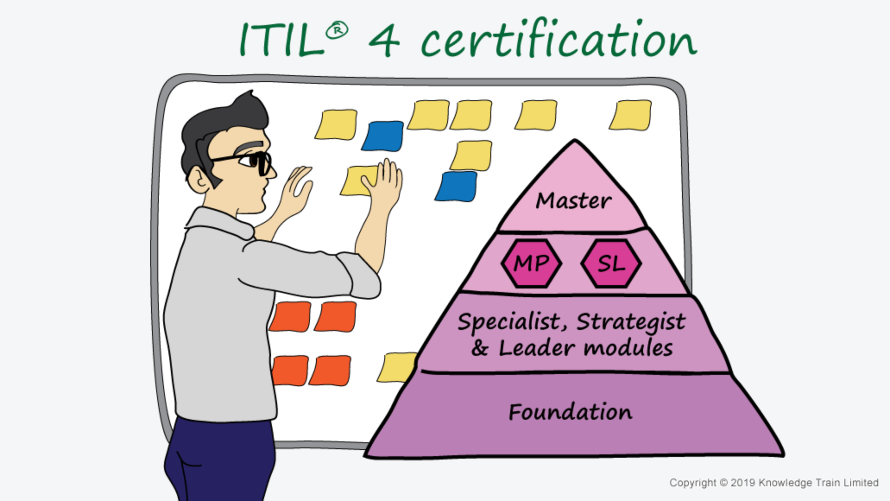ITIL 4 Certification overview
ITIL 4 Certification is a widely recognised credential in IT Service Management (ITSM). Achieving certification in ITIL 4 demonstrates expertise in the ITIL 4 framework, a standard adopted worldwide to enhance service delivery and operational efficiency. The ITIL 4 certification course offers a comprehensive learning path, including management training, governance, and information security practices. Candidates can access an online course, tailored for those looking to upskill or achieve an ITIL 4 qualification. The certification program includes official tests and assessments to ensure learners meet required standards and company goals.
Certification ITIL 4 learning format
Certification ITIL 4 provides a flexible format, with online courses, study guides, and practical examples for real application in project management and cloud settings. ITIL 4 accreditation ensures that managers, engineers, and stakeholders understand IT asset management, deployment, and continual improvement. The ITIL 4 cert is suitable for individuals, departments, and organisations seeking to align their IT services with business objectives. The ITIL 4 certification assessment can be completed online, often within 3 days.
ITIL 4 certification training and benefits
This course introduces the ITIL 4 credential, covering key topics such as incident management, software, platforms, and the four dimensions of service management. The ITIL 4 certification training includes options for remote study, revision bundles, and test preparation to support learners at every stage. Becoming ITIL 4 certified offers career growth, new roles, and upskilling opportunities for project managers, administrators, and technical leaders. By mastering the ITIL 4 qualification, attendees can implement and control ITSM processes, reduce costs, and assure and improve service value in their company.
Introduction to ITIL 4 certification
ITIL 4 Certification is a widely recognised IT service management credential in the United Kingdom and internationally.
This guide explains routes, benefits and practical steps to prepare for the certification in ITIL 4 and apply its practices within organisations.
Why choose ITIL 4 certification in the UK
Many employers in the United Kingdom favour candidates with ITIL 4 Certification due to proven service management value and credibility.
The programme links with industry standards and offers recognised designation and business value to professionals and teams.
Organisations planning digital transformation often look for staff with management training and proven experience in service management.
Training courses and accredited classroom or paced online options make the qualification accessible to a wide range of learners.
Choosing accredited online courses or led courses ensures the content aligns with the official syllabus and outcomes.
ITIL 4 certification course options
Certification ITIL 4 can be gained through different training course formats, including day course, classroom sessions and paced online study.
Many providers offer flexible training course schedules and both classroom and virtual formats to suit busy teams.
Some programmes bundle foundation with specialist or strategist modules to create comprehensive career pathways.
ITIL 4 certification online courses
ITIL 4 certification online options are popular for remote learners and teams, offering flexible dates and self-paced study materials.
Paced online delivery often includes assessments, downloadable documents and practice tests to help candidates prepare.
Certification in ITIL 4 tests and assessments
The ITIL 4 certification test typically includes multiple choice questions and optional practice assessments to boost pass rates.
Candidates can purchase vouchers or register directly with accredited partners to schedule test dates and retake policies.
Understanding the certification pathways
The ITIL 4 Certification scheme includes foundation, specialist, strategist and leader paths to support career progression.
The learning paths are designed to address roles from practitioner to strategic leader and to assure consistent outcomes.
Each pathway focuses on a set of modules and competencies that align with enterprise goals and IT strategy.
ITIL 4 foundation and essentials
The foundation module covers core principles, four dimensions and the 4 framework to ensure learners understand essential concepts.
Foundation study often includes scenarios, examples and short practice tests for rapid assessment and revision.
ITIL 4 managing professional and 4 specialist modules
Managing professional modules focus on practical processes like deliver and support, drive stakeholder value and plan and improve.
Specialist modules, such as high velocity IT and digital practices, enable professionals to apply skills in specific contexts.
ITIL 4 strategic leader and 4 strategist options
Strategist and leader pathways emphasise governance, strategy and leading digital transformation across teams and departments.
These routes are valuable for project management professionals, architects and senior managers seeking advanced designation.
Project management integration
Project management is a key entity within ITIL 4 practices, ensuring that change initiatives align with governance and business goals.
Using project frameworks alongside ITIL processes helps maintain efficiency, risk control and quality assurance in delivery.
Preparing for the ITIL 4 certification evaluation
Successful preparation blends structured study, practical exercises and mock assessments to improve knowledge and confidence.
Reviewing course materials, practice questions and module guides helps candidates familiarise themselves with evaluation format and timetables.
Many programmes recommend combining management training with hands-on tasks to apply concepts to real systems.
Certification ITIL 4 study guide and revision
A targeted study guide helps learners focus on key practices, processes and the service value system as described in the syllabus.
Use study plans, revision checklists and past papers to improve speed and accuracy in answering typical test questions.
ITIL 4 certification training and resources
Training providers often supply interactive materials, course materials, test vouchers and access to official practice tests.
Look for accredited providers that include instructor-led sessions, assessments and post-course support for candidates.
Training and skill development
Training provides hands-on understanding of service management and practical application of ITIL concepts in real environments.
Continuous professional development ensures that candidates retain their expertise and stay aligned with evolving practices.
What study methods work best?
Active learning through case studies, group discussions and labs helps learners retain and apply information more effectively.
Paced online study combined with periodic classroom review suits many professionals balancing work and learning.
Applying ITIL 4 in practice
After achieving ITIL 4 Certification, professionals can apply best practice to service design, change management and incident handling.
The guidance supports integration with other frameworks such as DevOps, Lean and PRINCE2 for broader delivery capability.
Practitioners use IT asset management and configuration techniques to maintain stable, traceable services.
Deliver and support practical approaches
Teams apply deliver and support practices to improve service desk operations, incident response and routine releases.
Clear runbooks, testing strategies and monitoring help maintain consistent service quality and reduce incident impact.
Plan and improve for continual value
Plan and improve activities guide organisations to assess current performance, set improvement goals and enact change management.
Continuous improvement often relies on metrics, stakeholder feedback and iterative changes to services and processes.
How does ITIL fit with other models?
ITIL complements frameworks like Lean, Six Sigma and Agile by offering structured guidance for governance and service management.
Organisations often combine ITIL practices with DevOps toolchains and modern engineering approaches to speed delivery.
Benefits for professionals and employers
ITIL 4 Certification increases candidate credibility and can improve job prospects, promotion potential and salary outcomes.
Employers benefit from consistent service management practices, reduced downtime and improved customer satisfaction.
The credential supports international mobility and recognition, with providers running courses across many locations including London and regional centres.
Career pathways and roles
Certified professionals often move into roles such as service manager, project manager, IT operations lead or service architect.
Specialist and strategist modules help individuals transition into leadership positions or niche technical roles.
Impact on organisational performance
Better service management leads to clearer responsibilities, improved governance and measurable business value.
Improved alignment between IT services and enterprise strategy helps deliver outcomes that stakeholders value.
Are employers seeing measurable returns?
Case studies show organisations achieving faster incident resolution, more predictable releases and improved customer outcomes.
Metrics such as reduced mean time to repair, higher first-time fix rates and fewer major incidents demonstrate tangible benefits.
Practical considerations for UK candidates
UK candidates should confirm provider accreditation, test regulations and whether legal or public sector standards apply to their role.
Check terms and conditions for test vouchers, retake rules and any required identification for test centres in the United Kingdom.
Many UK-based providers offer classroom, online and blended options to suit regional needs and job schedules.
Training courses and provider choice
When choosing a provider, compare course content, trainer experience, pass rates and post-course support for attendees.
Providers that offer practice test, downloadable guides and contactable trainers often improve candidate outcomes.
Costs, dates and booking
Training costs vary by provider, course format and inclusions such as test vouchers, guided revision and study materials.
Book well in advance for popular dates and consider weekday or weekend options to fit around work commitments.
What about remote tests and vouchers?
Many candidates now choose remote proctored tests or local test centres depending on availability and preference.
Vouchers can be purchased through providers or official partners and sometimes include retake options or support materials.
Tips to maximise test success
Create a structured study timetable that balances practical exercises, revision and timed practice tests.
Join study groups or discussion forums to share insights, clarify tricky concepts and gain fresh perspectives.
Use official guides, sample questions and verified training courses to ensure alignment with test standards.
Exam day strategies and time management
On exam day, read every question carefully, manage your time and answer the easiest questions first to secure marks.
Practice under timed conditions beforehand to build test endurance and avoid surprises on the day.
Post-exam next steps
After passing, update your professional profiles, share certification details with employers and plan follow-up training if needed.
Consider specialist or strategist modules to deepen expertise and broaden career opportunities in service management.
Conclusion and next steps
ITIL 4 Certification offers clear paths for UK professionals seeking to advance their careers in IT service management.
Choose accredited providers, follow structured study plans and use practice tests to maximise your chances of success.
Apply learning to real projects, work with stakeholders and integrate ITIL with complementary frameworks to drive business value.
Begin by selecting the right course format, assess available training courses and register for the foundation test when ready.
Good preparation, targeted revision and practical application will ensure that your ITIL 4 Certification supports both personal development and organisational goals.
Best of luck on your learning journey and please find out more from accredited UK providers when you are ready to book.



